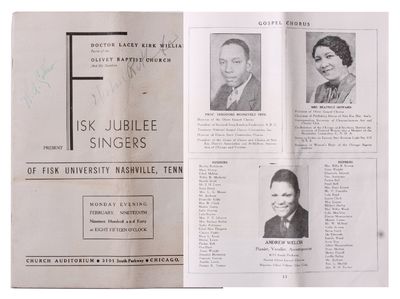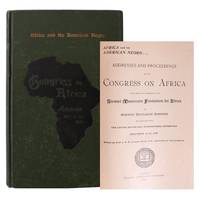1940 · Chicago, Illinois
Chicago, Illinois: [Olivet Baptist Church], 1940. Good. 11” x 8½”. Stapled wrappers. Pp. 24. Good due to heavy crease at old vertical center fold; penciled identifications to one image; small faint stains to a few pages' top edges. Signed by two of the singers on the front wrap.
This is a rare, heavily illustrated program for an appearance by the legendary Fisk Jubilee Singers at a Chicago Baptist church. Notably signed by two of the performers, the program is rich with profiles and photographic images of African American church and civic leaders, as well as advertisements for local Black-owned businesses.
The original Jubilee Singers were organized in 1871 to help raise funds for Fisk University, the Nashville HBCU. The a capella group introduced slave songs to the world, breaking racial barriers in the United States and abroad, and have been instrumental in preserving the musical tradition known as “Negro spirituals.” They continue to perform as a touring ensemble of Fisk students, have earned a Grammy and a National Medal of Arts, and in 2000 were inducted into the Gospel Music Hall of Fame.
This abundant souvenir program began with “Greetings” from Olivet Baptist Church pastor Lacey Kirk Williams, noting that, “In this changing age of social and industrial unrest it is significant that we pause to pay tribute to a group of youths who are carrying on the tradition” of the original Jubilee Singers – “leaders in the cultural development of the Negro Race and subsequently of our beloved country.” The book listed the spirituals to be performed, as well as a short history, individual bios and a photographic image of the present iteration: six male vocalists, their female accompanist, and musical director “Mrs. James A. Myers.” Henrietta Myers had been a Jubilee Singer in her college days and served as director for nearly 20 years. Each of the members was identified in pencil by this program's former owner, and the cover was signed by two of them, William Collier and Herbert Rutherford.
The remainder of the program, which holds 39 other images, was devoted to a vivid exposition of leading African Americans in the church and the community, most of whom were female. It ran a list of sponsors, church deacons and the 45 members of the “Cultural Committee” responsible for the event, 31 of whom were women. There are headshots and short bios of the 14 women who served as presidents of the church's various “Circles,” the female director and organist of the senior choir, and Mrs. Beatrice Howard, gospel chorus president who also served as chair of the New Era District Baptist Association publishing house and co-chair of the Chicago Association of Colored Women. Other musical legends were also spotlit, including Theodore Roosevelt Frye, noted composer, director of the gospel chorus and president of the National Baptist Convention's Song Leaders Conference; Lillian Bowles, proprietor of Bowles Music House and Record Printing Shop (and supervisor of the Sunday School's Junior Department); and Thomas A. Dorsey: “America's Foremost Gospel Song Writer” and co-founder of the National Convention of Gospel Choirs and Choruses, headquartered in Chicago.
The program also serves as record of Chicago Black-owned businesses, with 90 ads and sponsor messages (eight of which were illustrated), showcasing florists, beauty shops, grocers, photographers, restaurants and more. One full-page ad for the Chicago Defender quizzed, “How much do you know about your race?” Others revealed the female managers of Mme. C.J. Walker's Beauty College and the South Side Letter and Printing Service, along with the Chicago Bee, “The Nation's Only Negro Newspaper with a Radio Broadcast Station” and its editor, Olive M. Diggs. Diggs was also a city planner and public speaker on race relations; she directed the Neighborhood Youth Corps, served as Community Relations Assistant for the Chicago Land Clearance Commission and as Assistant Director of the Illinois Commission on Human Relations. The book holds an index to the advertisers and a “Classifieds” list of 36 other businesses, as well.
A rare program for a performance by an important Black musical group, with plentiful coverage of African American leaders in Chicago. No holdings were located in OCLC. (Inventory #: 8780)
This is a rare, heavily illustrated program for an appearance by the legendary Fisk Jubilee Singers at a Chicago Baptist church. Notably signed by two of the performers, the program is rich with profiles and photographic images of African American church and civic leaders, as well as advertisements for local Black-owned businesses.
The original Jubilee Singers were organized in 1871 to help raise funds for Fisk University, the Nashville HBCU. The a capella group introduced slave songs to the world, breaking racial barriers in the United States and abroad, and have been instrumental in preserving the musical tradition known as “Negro spirituals.” They continue to perform as a touring ensemble of Fisk students, have earned a Grammy and a National Medal of Arts, and in 2000 were inducted into the Gospel Music Hall of Fame.
This abundant souvenir program began with “Greetings” from Olivet Baptist Church pastor Lacey Kirk Williams, noting that, “In this changing age of social and industrial unrest it is significant that we pause to pay tribute to a group of youths who are carrying on the tradition” of the original Jubilee Singers – “leaders in the cultural development of the Negro Race and subsequently of our beloved country.” The book listed the spirituals to be performed, as well as a short history, individual bios and a photographic image of the present iteration: six male vocalists, their female accompanist, and musical director “Mrs. James A. Myers.” Henrietta Myers had been a Jubilee Singer in her college days and served as director for nearly 20 years. Each of the members was identified in pencil by this program's former owner, and the cover was signed by two of them, William Collier and Herbert Rutherford.
The remainder of the program, which holds 39 other images, was devoted to a vivid exposition of leading African Americans in the church and the community, most of whom were female. It ran a list of sponsors, church deacons and the 45 members of the “Cultural Committee” responsible for the event, 31 of whom were women. There are headshots and short bios of the 14 women who served as presidents of the church's various “Circles,” the female director and organist of the senior choir, and Mrs. Beatrice Howard, gospel chorus president who also served as chair of the New Era District Baptist Association publishing house and co-chair of the Chicago Association of Colored Women. Other musical legends were also spotlit, including Theodore Roosevelt Frye, noted composer, director of the gospel chorus and president of the National Baptist Convention's Song Leaders Conference; Lillian Bowles, proprietor of Bowles Music House and Record Printing Shop (and supervisor of the Sunday School's Junior Department); and Thomas A. Dorsey: “America's Foremost Gospel Song Writer” and co-founder of the National Convention of Gospel Choirs and Choruses, headquartered in Chicago.
The program also serves as record of Chicago Black-owned businesses, with 90 ads and sponsor messages (eight of which were illustrated), showcasing florists, beauty shops, grocers, photographers, restaurants and more. One full-page ad for the Chicago Defender quizzed, “How much do you know about your race?” Others revealed the female managers of Mme. C.J. Walker's Beauty College and the South Side Letter and Printing Service, along with the Chicago Bee, “The Nation's Only Negro Newspaper with a Radio Broadcast Station” and its editor, Olive M. Diggs. Diggs was also a city planner and public speaker on race relations; she directed the Neighborhood Youth Corps, served as Community Relations Assistant for the Chicago Land Clearance Commission and as Assistant Director of the Illinois Commission on Human Relations. The book holds an index to the advertisers and a “Classifieds” list of 36 other businesses, as well.
A rare program for a performance by an important Black musical group, with plentiful coverage of African American leaders in Chicago. No holdings were located in OCLC. (Inventory #: 8780)


![Souvenir. 1901-'02. The City of... Houston, Texas [Cover title]](https://d3525k1ryd2155.cloudfront.net/h/073/604/1693604073.0.m.jpg)
